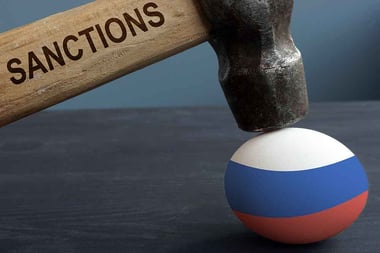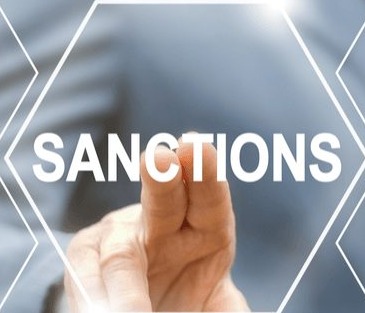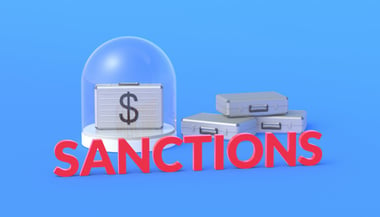While Turkey has been a Western ally since the mid-twentieth century, recent geopolitical developments have caused difficulties with the US, the UK, and the European Union (EU).
Turkey is a member of a number of international security organisations, including the UN and NATO, but it has been chastised for alleged human rights violations and breaches of international law, issues that have put the country's once-promising attempt to join the EU on hold. Turkey has lately been sanctioned by the United States, the United Kingdom, and the European Union for violating international sovereignty norms and unlawful arms sales.
Trade and commercial restrictions, asset freezes, and travel bans have all been imposed on Turkey. Companies doing business in Turkey or with Turkish consumers should be aware of their screening duties in order to comply with relevant sanctions rules and regulations.
EU Sanctions on Turkey
In reaction to Turkey's gas drilling activities in the eastern Mediterranean, the EU imposed sanctions. The sanctions are in response to growing tensions between Turkey and Greece, particularly over the sovereignty of specific Greek islands.
Turkey began drilling for natural gas off the coast of Cyprus in 2019, which the EU deemed an infringement of the island's sovereignty. Persons 'planning, preparing... engaging in, directing, or aiding' drilling activities not permitted by Cyprus, as well as those providing financial assistance for those activities, were targeted by the EU's Turkey sanctions, which went into effect in November 2019.
The sanctions put asset freezes and travel bans on their targets, and two members of Turkey's state-owned Turkish Petroleum Corporation (TPAO) have been added to the EU's sanctions list since their implementation. The EU Council agreed in November 2020 to prolong Turkey's sanctions for another year, until November 2021.
UK Sanctions on Turkey
While the UK has previously implemented EU sanctions (including those against Turkey), it now has its own sanctions framework following Brexit. The Unauthorized Drilling Activities in the Eastern Mediterranean (Sanctions) (EU Exit) Regulations 2020, which cancelled and replaced the previously applicable EU sanctions framework, went into effect on December 31, 2020, in the United Kingdom.
Persons linked to unlicensed drilling activity off the coast of Cyprus face asset freezes, financial prohibitions, and travel bans, similar to the EU's stringent penalties. The UK has yet to make any designations under the policy.
U.S. Sanctions on Turkey
In December 2020, the United States imposed sanctions on Turkey in response to the Turkish government's purchase of Russian military technology.
The infringement happened when the Turkish Presidency of Defense Industries (SSB), a civil entity charged with overseeing the procurement of military equipment, purchased a surface-to-air missile system from Rosoboronexport, a state-owned Russian arms exporter.
Turkey's dealings with Russia were in violation of secondary restrictions, which ban third countries from interacting with countries that are sanctioned directly by the US government.
The US government's 2020 Turkey sanctions, which were imposed under Section 231 of the Countering America's Adversaries Through Sanctions Act (CAATSA), restricted technology exports to SSB as well as a variety of financial transactions with SSB by US financial institutions.
Travel bans, asset freezes, and a prohibition on commercial interactions with US people were also imposed on four Turkish individuals who work for or are affiliated to SSB.
The US sanctions policy against Turkey focuses on the SSB, allowing US citizens to conduct business with other Turkish companies and individuals. Despite the fact that the sanctions were imposed by the Trump administration, Vice President Joe Biden has maintained a tough stance against Turkey, implying that the restrictive measures will continue.
Screening for Turkey Sanctions
Because of the sanctions imposed on Turkey, companies doing business with Turkish customers or consumers with ties to Turkey must be aware of their regulatory responsibilities.
This entails incorporating a sanctions screening solution into their AML/CFT compliance procedure, based on the most recent Turkey sanctions data.
The screening solution should also be capable of dealing with the unique obstacles of conducting business with Turkish consumers, such as the usage of Turkish naming customs and spellings, as well as the use of Turkish alphabet characters. Enterprises should use appropriate due diligence techniques to establish their clients' identities with a high degree of confidence and precision and monitor their transactional conduct for potential sanctions violations.
Tookitaki’s Sanctions Screening Solutions
When doing business with customers from Turkey or with ties to Turkey, businesses must ensure that they are not breaking international sanctions.
Explore our Smart Screening solution, powered by real-time screening and cutting-edge machine learning technology to enable efficient, accurate, risk-based sanctions checks against Turkish sanctions.
Name Matching Like No Other
Our powerful name matching engine screens and prioritises all name search hits, ensuring efficiency in the investigation process and reducing the cost of compliance.
This entails putting in place a suitable sanctions screening solution that is kept up to date with the most recent sanctions data and supports the Turkish language via translation and transliteration.
The specific challenges of screening potential Turkish sanctions targets, such as non-Western naming conventions, non-Latinate characters, and the use of nicknames and aliases, should all be taken into account for effective sanctions screening.
- It enables you to achieve 80% precision and 90% recall levels in your screening programme
- Advanced machine learning engine that powers 50+ name matching techniques
- Comprehensive matching is enabled by the use of multiple attributes i.e; name, address, gender, date of birth, incorporation and more
- Individual language models to improve accuracy across 18+ languages (including Turkish) and 10 different scripts
- Built-in transliteration engine for effective cross-lingual matching
- Scalable to support massive watchlist data
Screen Transactions In Real-Time
Our state-of-the-art screening architecture provides faster and more accurate matching that reduces held transactions. Our system automatically screens your existing customer base against any changes or additions to watchlists in real time. They’ll be detected and flagged with zero human intervention, leaving your team to concentrate on other issues.
- Real-time screening of parties involved in the transaction against sanctions lists of your choosing
- Near-matching capabilities powered by advanced machine learning produce highly accurate screening results, ensuring that legitimate payments are not delayed
Drive Operational Efficiency
Our self-adaptive system significantly reduces false positives, which allows you to focus on material risk.
- Using an AI-powered risk-based strategy, alerts are automatically triaged into three risk categories
- 85% – 90% of low-value alerts can be closed through fast alert disposition
- 60%+ reduction in false positives in comparison to legacy systems
Speak to a member of the team to learn more and ensure you’re not breaching international sanctions.
Anti-Financial Crime Compliance with Tookitaki?



